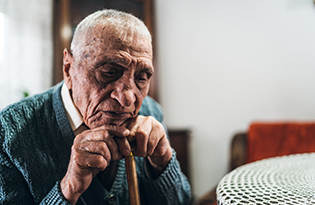Depression in the elderly population
12/22/2021 by Kyle McKenzie, M.D.

The COVID-19 pandemic has increased stress for everyone, which has increased discussions about mental health.
More frequent discussions about mental health is one thing positive that has come from the pandemic. This change is notable due to a long history of stigma attached to talking about mental health. However, this does not mean everyone is comfortable starting a conversation or openly discussing depression and mental health. Older generations may still feel uncomfortable with this. But everyone is still at risk for depression during such uncertain times.
What are common signs or symptoms of depression?
Depression, while more common as people age, is not a normal part of aging. Reasons for increased depression in the elderly include effects of chronic health conditions, physical limitations and the loss of loved ones. While everyone will feel down at times, if these feelings last weeks to months, it may suggest depression.
Common symptoms of depression include:
- Feeling sad, hopeless, helpless or guilty.
- Loss of interest in once enjoyable activities.
- Decreased energy.
- Difficulty sleeping.
- Irritability.
- Moving or talking more slowly.
- Thoughts of death or suicide.
What can be done if someone is experiencing depression symptoms?
First, if a person is having thoughts of suicide or self-harm, or expresses thoughts of suicide or self-harm, reach out for help immediately. Seeking emergency care and making sure the person is not alone must be the first step.
Over the last year and a half, isolation has been a big factor affecting mental health. The elderly have borne the brunt of this.
It is important to remain respectful of others when talking about mental health. Just reaching out, and providing socialization and talking, can be a good start. Making regular contact and extending a hand to involve them in activities can build on this.
Evidence suggests that psychotherapy, or talk therapy, as well as antidepressant medications can help. Primary care providers are sensitive to the effects of antidepressants and side effects in the elderly. They pay careful attention to medication selection and dosing to ensure they are well-tolerated. They also will watch for interactions with other medications. These should not be barriers to considering and discussing medications with one's health care provider. Therapy and medications are often used together.
Is there anything that can reduce the risk for depression?
Taking regular care of one's self and maintaining social contact can be beneficial in maintaining good mental health.
These are some reasonable steps to focus on:
- Get regular exercise.
- Maintain a regular sleep regimen.
- Eat a healthy diet.
- Keep socially active, even if just with a phone call or video chat during the pandemic.
- Stay active with hobbies.
Many elder care programs have options that provide low-cost or free phone calls with volunteers to provide another source of contact during this time. This often provides a nice resource to those who might not feel comfortable talking to family. Technology has made counseling services by video chat available to many in their own home, as well.
Continue to watch out for others. Know that many around you might be struggling. A kind and supportive word is never wrong to offer.
Kyle McKenzie, M.D., is an internal medicine physician and geriatrician in Primary Care in Rochester and Kasson's Division of Community Internal Medicine, Geriatrics and Palliative Care. His primary focus is care for the geriatric population and specifically working with those in long-term care settings. He is medical director for several skilled nursing facilities in surrounding communities, including Dodge Center, Hayfield, Pine Island and Plainview, Minnesota.
